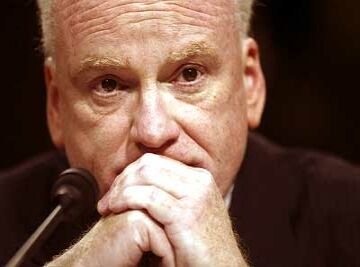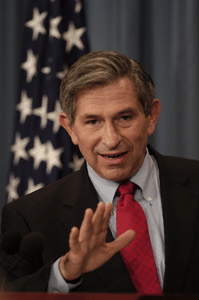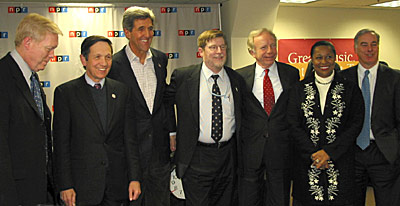Delusions of “Reality”
From The New CriterionNot long ago, as I was listening to a BBC reporter describing the latest terrorist outrage in Baghdad — scores killed. . . deteriorating security situation. . . Iraqi government helpless. . . military untrained and disorganized. . . terrorists operating at will etc. — it occurred to me that, even if all that the reporter had said were perfectly true, it was also exactly what the terrorists would have said if they could have written his script for him. Did this matter? Was it just a coincidence that the “reality” of the Iraq war, endlessly repeated and identified as such by the news media, so closely resembled the terrorist “narrative,” as our brainy students of textual deconstruction would put it? Or — the question seemed just worth asking — was reality itself being shaped by the terrorist narrative because of, first, the media’s predisposition to believe it and, second, the lack of any persuasive rival narrative from those who continued to claim, in more or less vague terms, that “progress” was being made against the insurgency?
I don’t know the answer to this question, but one indication of the importance of asking it came as the media themselves, perhaps emboldened by the success of their preferred party in the recent election, embarked on one of their periodic “reality” jags, proudly boasting of their own intimate relations with that elusive commodity and taking the occasion to pour scorn and contempt upon what they take to be the Bush administration’s unfamiliarity with same. For even if we are willing to accept that the media’s picture of the Iraq war is largely accurate, we cannot regard as credible the contention that not only the President of the United States but the entire administration over which he presides and the generals advising it are merely delusional. Nor can I share the easy assumption of the substantial Bush-hating faction in and out of the media that our President is so stupid as to be utterly blind to things obvious and transparent to the likes of Frank Rich of The New York Times or Keith Olbermann of MSNBC’s “Countdown.”
Here is what the latter said, as transcribed by the Media Research Center, about some remarks President Bush made on his trip to Vietnam in November: “It is a shame and it is embarrassing to us all when President Bush travels 8,000 miles only to wind up avoiding reality again. . . .But most importantly, important beyond measure, his avoidance of reality is going to wind up killing more Americans. And that is indefensible and fatal.” Well, killing usually is fatal, though it is not always indefensible. But Mr Olbermann’s obvious passion has distorted more than his English. What had excited his wrath was the President’s response to a question about the “lessons” of the Vietnam War in which he said that these, applied to the current war, included the fact that “the task in Iraq is going to take a while” and that “we’ll succeed unless we quit.” It is not so obvious to me as it apparently is to Keith Olbermann that these supposed lessons are misconstrued, but let’s say that they are. How does that tell us anything about the President’s grasp of “reality”? Does he really think that President Bush — or any American president in wartime — could conceivably have said anything else?
It may be, that is, that Iraq is like Vietnam, at least in being not only a losing struggle but an unwinnable one, but even if the commander-in-chief thought so, he would be mad to say so instead of quietly trying to find a way to extricate American forces — which is in fact what he seems to be doing. If Mr Olbermann thinks otherwise, then he is the delusional one. The same affliction seems to trouble Frank Rich, who professes to believe that his president “isn’t merely in a state of denial but is completely untethered from reality. It’s not that he can’t handle the truth about Iraq. He doesn’t know what the truth is.” The blithe insouciance with which Mr Rich issues such a serious charge is itself evidence of its ridiculously hyperbolical nature. Generally speaking, the rhetorical resort to the popularized language of psychotherapy should be treated as prima facie evidence of a lack of intellectual seriousness, and that applies in spades to any allegation of psychosis against one’s political enemies.
If Mr Rich actually thought that the President was a victim of mental illness, he would have used more sober language and consulted one or two more qualified diagnosticians than himself, rather than simply tossing off the accusation as part of his weekly anti-Bush rant. At least he would have attempted to find better evidence for his psychiatric assessment than the following examples:
- “[He insists] that al-Qaeda is primarily responsible for the country’s spiraling violence . . . [even though] military intelligence estimates that Al Qaeda makes up only 2 percent to 3 percent of the enemy forces in Iraq”
- “Mr. Bush relentlessly refers to Iraq’s ‘unity government’ though it is not unified and can only nominally govern”
- “After that pseudo-government’s prime minister, Nuri al-Maliki, brushed him off in Amman, the president nonetheless declared him ‘the right guy for Iraq’ the morning after.”
- “No one doubts that the most powerful political leader in Iraq is the anti-American, pro- Hezbollah cleric Moktada al-Sadr, without whom Mr. Maliki would be on the scrap heap next to his short-lived predecessors, Ayad Allawi and Ibrahim al-Jaafari. . .But our president shows few signs of recognizing Mr. Sadr’s existence.”
- “When the president persists in talking about staying until ‘the mission is complete’ even though there is no definable military mission, let alone one that can be completed, he is indulging in pure absurdity. The same goes for his talk of ‘victory,’ another concept robbed of any definition when the prime minister we are trying to prop up is allied with Mr. Sadr, a man who wants Americans dead and has many scalps to prove it.”
Once again, as in Mr Olbermann’s case, Mr Rich’s propositions strike me as being far from self-evident. He himself notes that the identification of Mr Maliki as “the right guy for Iraq” was made “only a day after The Times’s revelation of a secret memo by Mr. Bush’s national security adviser, Stephen Hadley, judging Mr. Maliki either ‘ignorant of what is going on’ in his own country or disingenuous or insufficiently capable of running a government.” Did the President’s delusional state render him incapable of reading the memo? Of course not. As with all the “stay-the-course” rhetoric, he was only saying what he had to say in the circumstances. None of Mr Rich’s examples of delusional behavior except, possibly, the first amount to anything but the conventional language of diplomacy — used by all political leaders to conceal rather than to reveal realities — and none can tell us anything about whether this political leader knows what reality is. Even in the case of the al-Qaeda reference, it may be imprecise but it is hardly delusional to refer to those who are the frequent allies and collaborators of al-Qaeda and who have made common cause with it by the same name.
Like all speech, political speech happens within a context which contributes at least as much to its meaning as the bare semantic import of the words do, and which often changes the latter completely. This is what is called irony. It is not possible that Messrs Olbermann and Rich do not know this, and yet they assume, when it suits their purposes to do so, that every word their political b te noire says must be said out of deepest personal conviction and without regard to its context. Towards the end of his column, Mr Rich even professes to see further evidence of his delusional state in the President’s polite inquiry after the son of a new member of the Senate:
You can understand why Jim Webb, the Virginia senator-elect with a son in Iraq, was tempted to slug the president at a White House reception for newly elected members of Congress. Mr. Bush asked “How’s your boy?” But when Mr. Webb replied, “I’d like to get them out of Iraq,” the president refused to so much as acknowledge the subject. Maybe a timely slug would have woken him up.
President Bush, as Mr Rich cannot be unaware, was merely engaging in polite conversation, the rules of which — including the rule that some things are appropriate to say on a social occasion when you are a guest in someone’s house and some things are not — used to be well understood by everybody. But just as the boorish Mr Webb seems not to understand (or not to want to understand) the niceties of social intercourse, so the disingenuous Mr Rich, having ignored the context of the President’s political and diplomatic remarks finds no difficulty in ignoring the context of his social speech as well if that provides him with yet another opportunity to ride his latest hobbyhorse and reiterate what can only be a feigned belief in Mr Bush’s psychotic state.
Like Mr Olbermann, he has also in the past been one of those who promiscuously charge the President with “lying.” Well, which is it? Is he telling the truth but delusional or is he relatively clear-sighted and lying? Both things cannot be true, since anyone who was genuinely delusional would not see any need to lie. Heedless of the contradiction, Mr Olbermann’s tirade plunges on to repeat his frequent charge of mendacity, citing as “the fifth crucial lesson of Vietnam,” the claim that “if you lie us into a war, your war and your presidency will be consigned to the scrap heap of history.” Mr Rich at least attempts to account for the conflict between these rival explanations of his behavior by saying that he used to think President Bush was lying but now thinks he is delusional — a rationalization that would carry more weight if it didn’t suggest either a plainly implausible switch from the one to the other at some earlier point in his presidency or a tergiversation on the writer’s part as to which explanation would be the more discreditable. Did he also, that is, entertain the possibility that the object of so much vitriol might — at any point or about anything — have been right?
It may be na veté on the part of these men to imagine that political, military or diplomatic speech is or ought to be an exercise in sharing the thoughts and feelings of the speaker rather than a means of coalition-building and preservation, but it cannot be merely na veté. There is in the assumption a kind of willed ignorance of the basic realities of political life which is, ironically, the same thing they are alleging against President Bush. I mention this not to do as they do and suggest that mental illness is what lies behind their intemperate musings but rather to point out that the language of the media has more in common with the language of diplomacy and politics than the media would care to admit. Truth — or, if you prefer, “reality” — is not the object of either, though it is essential in both cases to keep up the pretense, however transparent, that it is. The more the media bang on about “reality” the more apparent it is that what they mean is the version of reality which it is their rhetorical project to establish in the public mind as the only legitimate one.
That is of course what politicians do all the time, as the endless references to “spin” by those, including the media, who are the victims of it confirm. But a further stage in the media’s progress towards ever more unashamed partisanship is marked by the fact that they are now spinning with the best of them. Consider the “debate” that arose with the commencement of the Christmas shopping season as to whether or not the Iraqi insurgency amounted to a “civil war.” To understand it, you have — as you so often do — to go back to the media’s heroic age in the 1960s. Then, among the mighty deeds done by them in their own triumphalist conceit was the ending of an “illegal and immoral war,” which was supposedly accomplished by the legendary statement of Walter Cronkite in 1968 that he had come to believe that the Vietnam war was “unwinnable.” Lyndon Johnson is famously supposed to have responded by saying: “If I’ve lost Cronkite, I’ve lost Middle America” and thereafter withdrew as a candidate in the presidential election to seek a negotiated peace.
Earlier this year, Mr Cronkite attempted to repeat the magic by announcing that he thought the same about Iraq. Now there’s a surprise. The media must have remembered how much of his credibility had depended on the argument of the antiwar left that the war in Vietnam was a civil war in the outcome of which America could have had no conceivable interest that was worth the lives of — at that time — more than 20,000 of her sons. I set on one side here all question as to whether or not this proposition was true or, if true, whether or not its establishment as such by Mr Cronkite really had as much to do with the American withdrawal from that war as media mythology has it. As in so many other political spheres, perception is all, and in the media’s own perception of history, both have the status of established fact. Therefore, presented once again with the task of effecting an American retreat from engagement with a foreign enemy, the media were disposed to stress every point of similarity between Iraq and Vietnam, including the characterization of both struggles as civil wars.
The current phase of this very one-sided debate seems to have begun with an article by Edward Wong in The New York Times on the Sunday after Thanksgiving noting that “leaders and policy analysts say the fighting in Iraq meets the standard definition of civil war.” I hadn’t known that there was a “standard definition” of civil war, but it seems that there is. “The common scholarly definition,” Mr Wong continues,
has two main criteria. The first says that the warring groups must be from the same country and fighting for control of the political center, control over a separatist state or to force a major change in policy. The second says that at least 1,000 people must have been killed in total, with at least 100 from each side.
Aided by this definition, we learn, “American professors who specialize in the study of civil wars say that most of their number are in agreement that Iraq’s conflict is a civil war.” Indeed, “many scholars say the bloodshed here already puts Iraq in the top ranks of the civil wars of the last half- century.” Nor is it only the professors and scholars. Mr Wong himself helpfully notes that “the carnage of recent days — beginning with bombings on Thursday in a Shiite district of Baghdad that killed more than 200 people — reinforces their assertion.”
After acknowledging that some — notably the military historian John Keegan, writing in the December issue of Prospect — don’t agree that the situation in Iraq amounts to civil war, Mr Wong concluded with the explanation of one scholar as to why it is important to affix that label to the conflict.
“Why should we care how it is defined, if we all agree that the violence is unacceptable?” asked Mr. [David D.] Laitin, the Stanford professor. “Here is my answer: There is a scientific community that studies civil wars, and understands their dynamics and how they, in general, end. This research is valuable to our nation’s security.”
Once again, it’s “reality” to the rescue. Once we have correctly identified the genus and species of the conflict, then we can march our crack corps of academic irregulars into the fray and sort it out, to the unspeakable benefit of “our nation’s security.” What was really at stake was better indicated the next day when Matt Lauer announced on the Today show, as if it were a big breaking story in its own right, that the wise heads in charge of NBC News had decided to call the insurgency a civil war. On that evening’s edition of the “NBC Nightly News,” Andrea Mitchell repeated: “While Washington looks for answers, the violence in Iraq is spiraling out of control. Today NBC News joined other major news organizations in calling it a civil war.” Citing the authority of the televisually ubiquitous historian Michael Beschloss, she went on to note that “Today the administration objected strongly to news organizations’ calling it a civil war. Many experts say that the White House has a huge incentive to avoid that term because it could further erode public support for keeping U.S. troops in Iraq.”
Not that the media could have had any incentives of their own the other way! Keith Olbermann, for instance, took the occasion of NBC’s bombshell to wonder hopefully: “Is this the ‘Walter Cronkite moment’ of the Iraq War?” By the following Wednesday (November 29), the anti-war New York Times ran a featured news story — “Bush Declines to Call Situation in Iraq Civil War” — and an editorial which confidently pronounced that “at this point it is hard to tell who is more out of touch: President Bush, who continues to insist that Iraq has not descended into civil war, or Prime Minister Nuri Kamal al-Maliki, who appears to believe that Americans will prop him up indefinitely. . .” The administration’s “denial” of the civil war hypothesis had thus become a further proof of the oft-reiterated proposition that it was “out of touch” with reality (or in clinical “denial”) and so inspired Frank Rich’s flight of psychotherapeutic fancy a few days later.
There are, of course, many reasons for thinking that the War in Iraq is the “fiasco” described by Thomas E. Ricks in his recent book of that name — among them the appointment of the Iraq Study Group, which showed far better than anything he said that President Bush had a lively appreciation of the political — if not of the military — realities of the war. The Group’s report, issued in the first week of December, duly confirmed the media’s version of “reality,” as it could hardly have failed to do, given its bipartisan make-up. But its conclusions were as much designed to conciliate the Group’s constituency, which is the foreign policy establishment, as President Bush’s assurances of optimism and confidence were to conciliate his or the media’s psychiatric speculations theirs. When Robert Gates went before the Senate Armed Services Committee for his confirmation hearings to succeed Donald Rumsfeld as Secretary of Defense he said that we weren’t winning in Iraq, the fact that he knew that was what he had to say in order to get confirmed cannot be considered an irrelevant datum. What he really thinks about the matter is no more accessible to media investigation than what the President really thinks. They both have said what they had to say — as, I suppose, given their audience’s interest in the “realities” beneath public appearances, the media have done too. But at least this is a reason not to take too seriously their reports of doom and disaster in Iraq.
Discover more from James Bowman
Subscribe to get the latest posts to your email.






